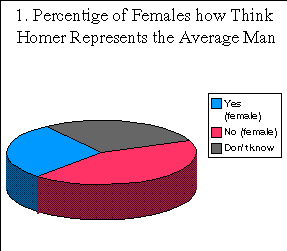
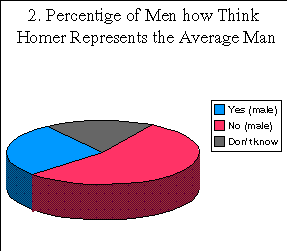
Simpsons research
Gateway to Health and Caring
South Kent College
Ashford
by
Christian Freundel
Although there are problems involved in research using a questionnaire most of this can be overcome through a pilot study. This problems might be of the nature of, questions on a questionnaire contain sociological jargon which sounds 'normal' to the Sociologist. Questions might be ambiguous (have two meanings) or lead, guide the reader to a certain answer or not have that answer as an option. The instruction could be unclear for what the participant is supposed to do or fill in on the questionnaire.
Questions I have altered due to my pilot study, which involved a total of ten participants.
In Question 3 in the Questioner added two boxes. One with 'More than twice a week' and the other with 'Less then once every two weeks' because found people were writing this on the Questioner. Question seven changed the phrasing from 'How regularly do you read/watch those other Comics/Cartoons' to 'How regularly on average do you read/watch those other Comics/Cartoons'. This change was made to avoid confusion of which 'other' Comics/Cartoons should be used to make the statement about the number of time that 'other' Comics/Cartoons was watched. To questions 9; 10; 11; 18 added a 'Don't know' Checkbox, for found that some were not filled in, in the pilot study. In question 14 added one checkboxes, 'under 10' because again people were writing this in on the pilot study. Even though had to make some changes to questioner after the pilot study, I found that I was getting the data I required to answer my hypothesis.
My sample is not representative of a large population because it is not large enough and it is not selected from a clear sample frame. Nor is the number of males and females how answered the questionnaire evenly split. The sample size is 29 people, of which there are 7 females and 22 males. Nine of which were answered anonymously though the Internet. The other 13 were answered either by students in South Kent college or through random sampling in Ashford city centre. Therefore the findings are and can not be generalized for a wider population
[Sample of the questionnaire can be found in the Appendix.]
This hypotheses is related to question number 1 on the questionnaire 'are you male or female?' combined with question number 2 'do you watch and/or read the Simpsons?'.
22 males and 7 females participated in the survey.
This indicates that more that 2/3 of the Simpsons views are male, and only 1/3 is female. Therefore I have to reject my H1.
This hypotheses is related to question number 9 'do you think Homer represents how the average man is?' and question 1 'are you male or female?'.


The data clearly indicates that the percentage of males is higher than the percentage of females how said that Homer did not represent the average man. Note the high percentage of 'Don't know' in the female pie chart. This result indicates that H2 was not meat, and therefore I have rejected it.
This hypotheses is related to questions number 14 'What age are you?', number 16 'do you think, there are hidden messages/references in the Simpsons?', question number 17 'If yes (refers to hidden messages/references), name one if you can' and question number 18 'are this subtle suggestions (refers to hidden messages/references) one reason why you watch the show?'.
N.B. The age group 26-30 was represented by one person only. That is why the three graphs they are either N/A or represented with 100% 'No'.
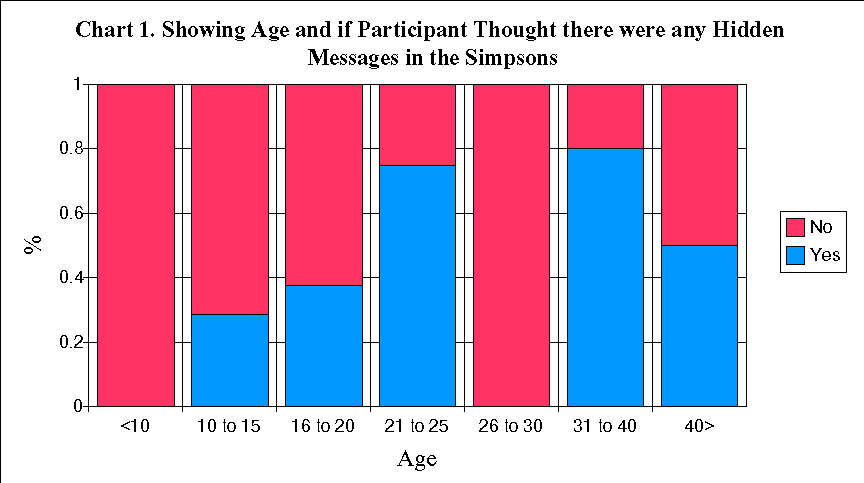 Chart 1 showing the participants age
and if they though that there were any hidden references/messages in
the Simpsons. This is indicated by the size of the blue columns.
Note the steep rise from age groups 16-20 to 21-25. This rise
supports my H3.
Chart 1 showing the participants age
and if they though that there were any hidden references/messages in
the Simpsons. This is indicated by the size of the blue columns.
Note the steep rise from age groups 16-20 to 21-25. This rise
supports my H3.
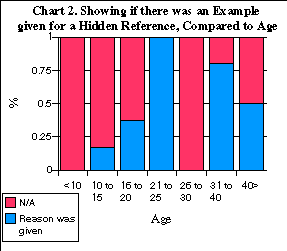
Chart 2 shows if the open ended
question 17 'If yes name one if you can' (this is referring to the
hidden references/messages)[see Appendix]. The Diagram shows whether
an answer was given or not. Note again the steep rise from age
groups 16-20 to 21-25. This rise supports my H3.
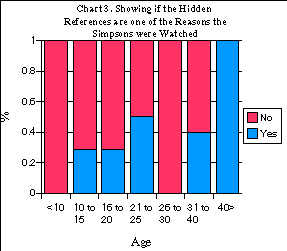
This Chart 3 shows if the hidden messages/references is one of the reasons the participant watches the Simpsons. Although the increase is slight in the age groups 21-25 & 31-40 there is a increase. In the age group over 40 (40>) 100% of participants watched the Simpsons because of hidden references/messages. This supports my H3.
Through the Pilot study it was apparent that the questioner would provide me with the data I required to answer my hypotheses. The additional questions on the questioner were interesting but not necessary to be able to answer my hypotheses. A problem was getting people to find the questioner on the Internet.
It would be good to advertise the questionnaire more on the Internet, or post it on a well known site. I.e. not use a site that has just started, and thus was not known at all. In addition to this there was the time factor. If I had to do this work again it would be vital to have more time, to be able to get more raw data. It might be interesting to talk to people about the Simpsons (or other cartoons/comics) rather then getting them to fill in a questioner, to find out how people think cartoons/comics effect children, and to ask children about there views on Supperheroes etc., or 'antiheroes' like Homer.
I have looked at the differences in the understanding of certain subtle insinuations in the Simpsons related to age (Diagrams 1-3). It might be possible that the first approach (media effect) of passively receiving a media text is what younger age groups experience (e.g. 0 - ~15), and the second approach (being able to 'read' the media text) being what people after a certain age experience (e.g. from 15 to 16 years onwards). In light of resent debates and events discussing the relationship for screen sex and violence and violent children (e.g. David Cronenberg's controversial film 'Crash'), there might be a connection between the two.
I have disregarded my H1 and H2 and accepted my H3.
The findings for H1 indecent that 1/3 of the Simpsons viewers are female. This findings may also be due to the size of the sample further research is necessary. By looking at the data combined with H2 it can be see that the percentage of males is higher than the percentage of females how said that Homer did not represent the average man. Again this might be due to the low percentage of female participants. The third hypotheses, which I accepted, the data clearly indicates an increase correlation with age and the understanding of subtle insinuations in the Simpsons. All three questions relating to this hypotheses produced data that increases to a certain age and then drops of again. This might be due to the comparatively low number of participants over the age of 26. This might indicate an age were people stop watching the show or never started to watch it. Further research is necessary to prove this though.
Alternative ways of researching might be showing one episode of the Simpsons to a sample audience, after which the participants could be interviewed.
Overall it can be said that this research shows that over 2/3 of Simpsons viewers are male. It can further be assumed, that about the same amount of males and females think that Homer represents how the average man is (about ¼ of the sample). The data of the third hypotheses showed that there is a correlation between age and understanding subtle insinuations in the Simpsons. The assumption was made that on average the Simpsons are viewed to the age approximately 26 yeas. Although further research would be necessary to prove this. Finally it can be concluded that sample of this research was to small which may have influence the results, and if further research were to be conduced the sample size would have to be considerably bigger.
|
Title |
Author |
Date of publication |
|---|---|---|
|
Sociology in Action series 'Investigating the Media' |
Paul Trowler |
1988 |
|
Adult Comics-An introduction |
Roger Sabin |
1993 |
|
Comics-ideology, power & the critics |
Martin Barker |
1989 |
|
Sociology Review |
Andrew Jones |
Vol. 7 No. 1 Sep. 1997 |
|
Sociology in Action series 'Investigating Mass Media' |
Paul Trowler |
1996 |
|
Sociology-a new approach |
Edited by Michael Haralambos |
1986 |
I am a student at South Kent College in Ashford. For my Sociology project I am conducting a survey about the Simpsons. Please read the questions carefully, and write your answer in the appropriate box or put a tick in the appropriate box. All information given here is strictly confidential and will only be seen by myself and my tutor Simon Fox. Please answer the questions as accurately as possible. Thank you for your help!!
1. Are you male or female?